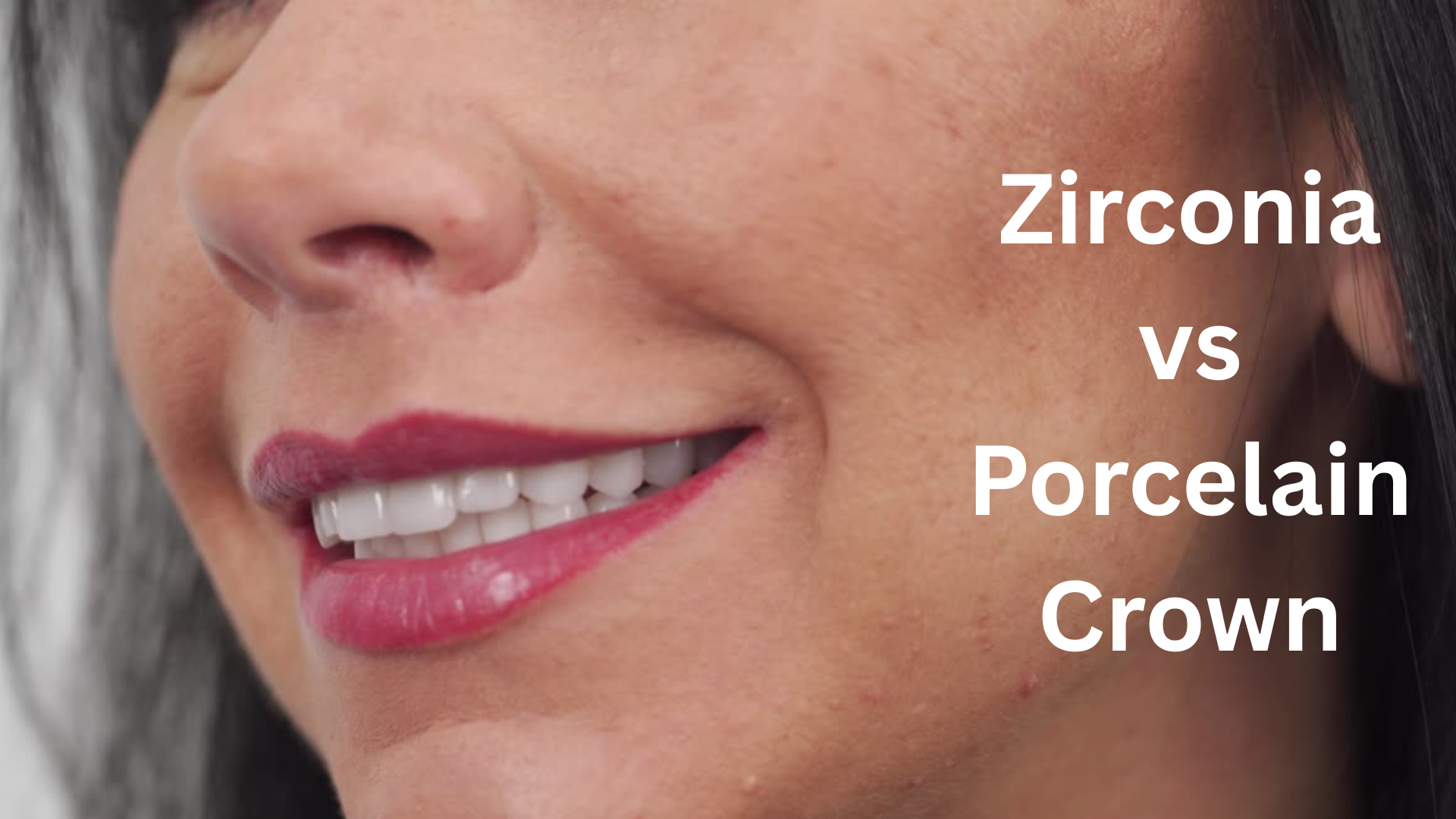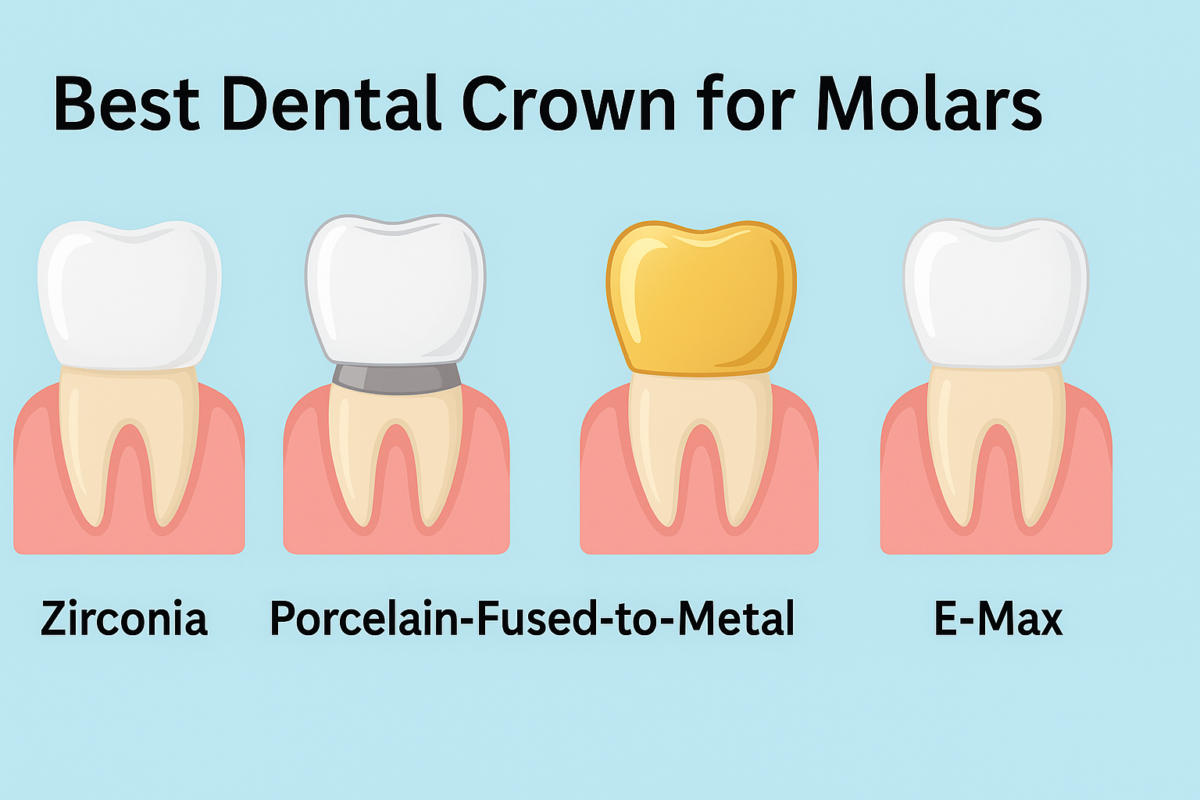
Zirconia vs Porcelain Crown
When it comes to restoring damaged or decayed teeth, dental crowns are one of the most popular and effective options. Among the various types of crowns available, Zirconia and Porcelain crowns stand out due to their aesthetics and strength. But which one is best for your specific needs?
In this detailed guide, we’ll compare Zirconia vs Porcelain crowns in terms of material, durability, aesthetics, cost, biocompatibility, and more — so you can make an informed decision in consultation with your dentist.
What Is a Dental Crown?
A dental crown is a tooth-shaped cap placed over a damaged tooth to restore its shape, strength, function, and appearance. Crowns can be made from various materials like metal, porcelain, resin, ceramic, or zirconia.
Overview: Zirconia Crowns
Zirconia crowns are made from zirconium dioxide, a very strong type of ceramic material.
Key Features:
- Extremely strong and durable
- Highly biocompatible
- Metal-free (ideal for people with allergies)
- Can be monolithic (solid) or layered for better aesthetics
Overview: Porcelain Crowns
Porcelain crowns (also known as all-ceramic crowns) are made entirely of dental-grade porcelain, a glass-like ceramic.
Key Features:
- Highly aesthetic and natural-looking
- Mimic the translucency of natural teeth
- Suitable for front teeth restorations
- Less durable than zirconia under heavy chewing pressure
Zirconia vs Porcelain Crowns: In-Depth Comparison
- Aesthetics
- Porcelain Crowns: More translucent and natural-looking, ideal for front teeth.
- Zirconia Crowns: Slightly opaque but now available in layered or translucent forms that closely mimic natural teeth.
Winner for aesthetics: Porcelain (slightly)
- Durability and Strength
- Zirconia Crowns: Extremely durable, resistant to cracking and chipping, excellent for molars and bruxism patients.
- Porcelain Crowns: More prone to cracking under pressure or sudden force.
Winner for strength: Zirconia
- Tooth Preparation
- Zirconia Crowns: Require less tooth reduction due to their high strength even in thin sections.
- Porcelain Crowns: Require more tooth structure removal for proper fitting.
Winner for conservation: Zirconia
- Biocompatibility
- Zirconia Crowns: Excellent biocompatibility, minimal allergic reactions, low plaque accumulation.
- Porcelain Crowns: Also biocompatible but may cause mild irritation in some cases.
Winner: Zirconia
- Longevity
- Zirconia Crowns: Can last 10–15+ years with good care.
- Porcelain Crowns: Typically last 7–10 years.
Winner: Zirconia
- Cost
- Zirconia Crowns: Slightly more expensive due to material and advanced technology.
- Porcelain Crowns: More affordable, especially if used on front teeth.
Winner for affordability: Porcelain
Clinical Use Case
| Tooth Location | Best Option |
| Front Teeth | Porcelain |
| Molars & Premolars | Zirconia |
| Bruxism Patients | Zirconia |
| Cosmetic Demands | Porcelain (layered zirconia can be used too) |
Final Verdict
Choose Zirconia Crowns if:
- You need a crown for back teeth or bruxism
- You prefer a metal-free, strong, and long-lasting option
- You want minimal tooth reduction
Choose Porcelain Crowns if:
- You want the most natural look for front teeth
- You are not under high chewing stress
- You prefer a more affordable option
Consult with your dentist to evaluate your individual case, tooth location, oral habits, and cosmetic preferences.
Related Reads
Complete Guide to Dental Crowns: Types, Materials, Cost & Best Choices for You
Root Canal with Crown vs Without Crown: What You Need to Know
Best Dental Crown for Molars: A Complete Guide
FAQs
- Which is more expensive: zirconia or porcelain crown?
Zirconia crowns are generally more expensive due to their strength and durability.
- Can zirconia crowns look natural?
Yes. Modern translucent or layered zirconia crowns mimic natural teeth quite well.
- Do porcelain crowns chip easily?
They can chip under strong forces or with teeth grinding, especially in back teeth.
- Are zirconia crowns safe?
Yes, zirconia is biocompatible and safe for long-term use in the mouth.
- How long do porcelain crowns last?
They usually last 7–10 years with proper oral hygiene and care.
- Which crown is best for molars?
Zirconia crowns are best due to their superior strength.
- Can I get a porcelain crown for molars?
You can, but they may be prone to fracture under heavy chewing.
- Do zirconia crowns require special care?
No, just maintain regular brushing, flossing, and dental checkups.
- Will my crown color match my natural teeth?
Yes, both types can be shade-matched by your dentist.
- Is zirconia crown stronger than natural teeth?
Yes, zirconia is harder than natural enamel, which may sometimes cause wear on opposing teeth.




